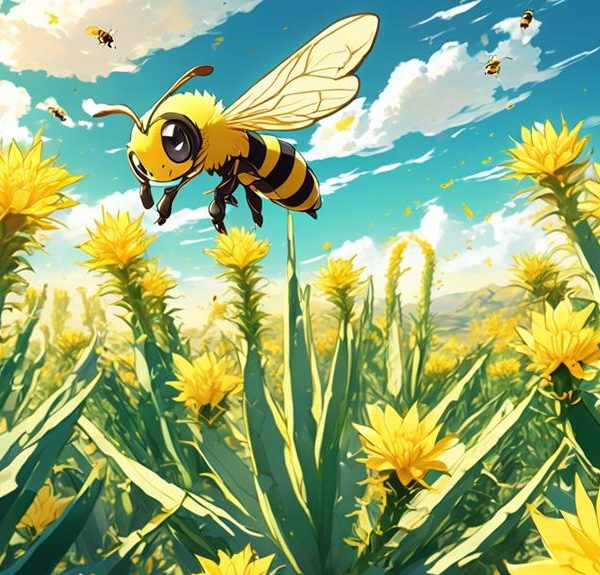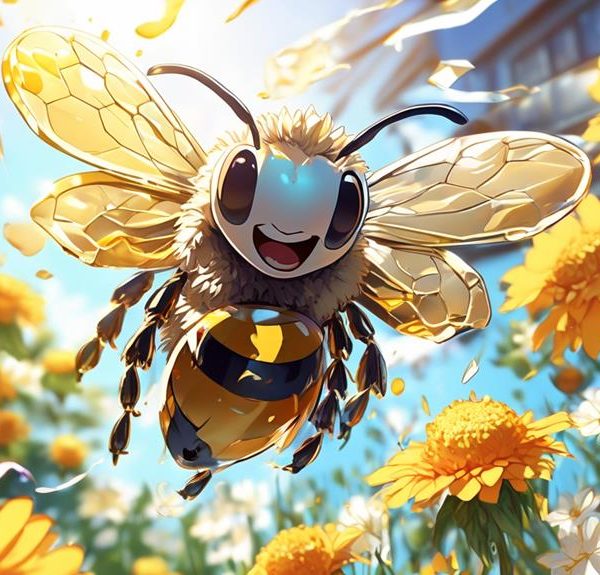Yes, bees have a special affinity for Alsike Clover; find out why this matters for beekeepers and how it could revolutionize your apiary practices.
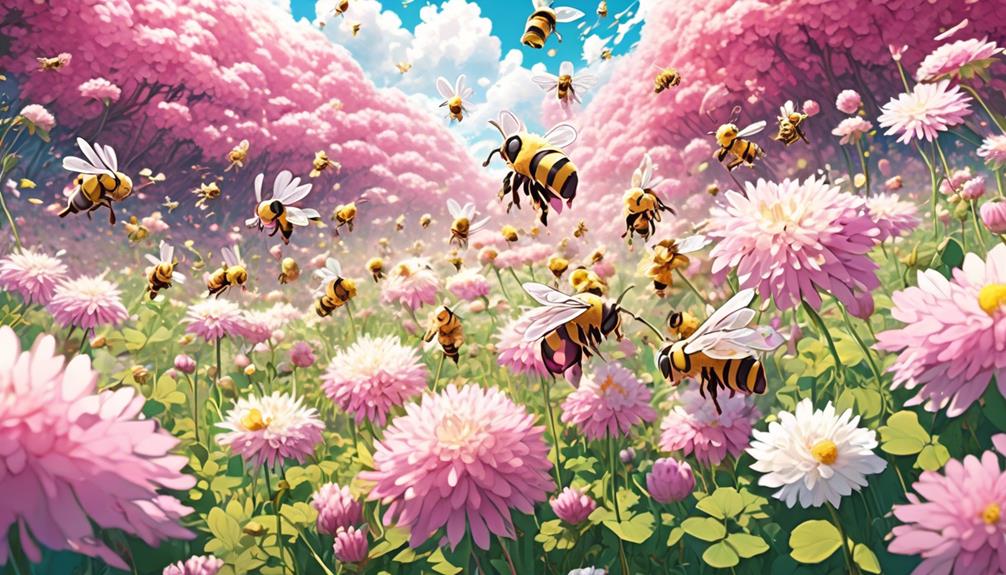
Do Bees Like Alsike Clover
Imagine you're a beekeeper in the heartland of America, surrounded by vast fields of Alsike Clover. You've noticed that your bees seem particularly attracted to this plant, buzzing around it more so than any other in the vicinity.
This observation leads you to wonder, do bees have a special preference for Alsike Clover? As we explore this question further, you'll discover a fascinating interplay between bees and this particular type of clover, shedding light on why your bees might be favoring it.
This knowledge could significantly impact the way you manage your hives and cultivate your fields, but to understand why you'll need to stick with us a little longer.
Key Takeaways
- Alsike clover is an ideal plant for attracting bees due to its abundant nectar production and visually appealing white and pink blossoms.
- Bees play a crucial role in ecosystem health and agriculture, and their preference for plants like Alsike clover supports their survival and promotes biodiversity.
- Integrating Alsike clover into beekeeping practices can increase honey production and support the overall health of bee populations.
- Planting Alsike clover enhances bee survival rates, expands their geographical range, and reduces the risk of starvation during periods of dearth.
Understanding Alsike Clover
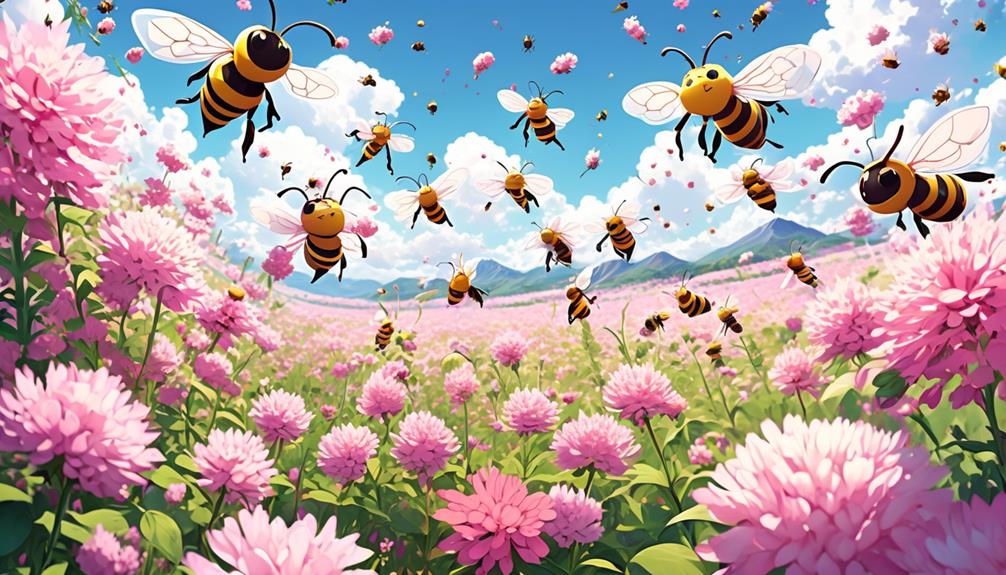
While you might be familiar with red and white clover, Alsike clover is a lesser-known species that boasts a unique set of characteristics beneficial to both bees and human agriculture. Its scientific name, Trifolium hybridum, hints at its hybrid nature and versatility.
Originating from Europe, Alsike clover isn't finicky about soil conditions. It's a hardy plant that grows well in both acidic and alkaline soils, and it doesn't mind if the soil is poor in nutrients.
Alsike clover's flowers are a mix of white and pink, making them visually appealing to bees. Its nectar, rich in sugar, provides a high-energy food source for bees. You mightn't know that Alsike clover also fixes nitrogen in the soil. This process enriches the soil, enhancing the growth of other plants.
For human agriculture, it's a valuable cover crop, suppressing weeds and preventing soil erosion. While it's not as widely used as red or white clover, its resilience and versatility make Alsike clover worth considering in your agricultural or bee-friendly gardening practices.
The Importance of Bees
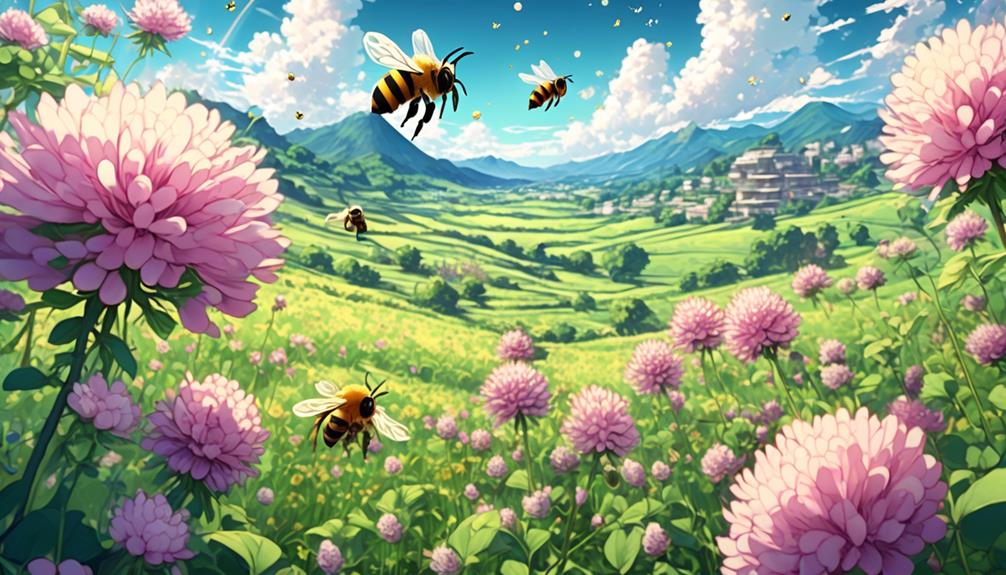
Building on the appealing features of Alsike clover for bees, it's essential to fully grasp why these buzzing insects are so crucial for our ecosystem and agriculture. You see, bees play an indispensable role in pollinating plants, which is a key process for plant reproduction and food production. Their impact is substantial and far-reaching.
Here's a simplified breakdown:
Role of Bees | Impact | Importance |
|---|---|---|
Pollination | Facilitates plant reproduction | Ensures biodiversity |
Honey Production | Source of food and medicine | Contributes to human health and economy |
Ecosystem Balance | Supports other wildlife | Promotes ecological balance |
Without bees, many plant species, including our beloved Alsike clover, would struggle to reproduce. This would lead to a decline in plant diversity, negatively affecting the entire food chain. Moreover, the honey bees produce is not only a nutritious food source, but also has medicinal properties.
The balance of our ecosystem and the sustainability of our agriculture largely depend on bees. Therefore, understanding the relationship between bees and their preferred plants, like Alsike clover, is crucial. This knowledge helps us to protect and support these vital pollinators better.
Bee Preferences for Plants
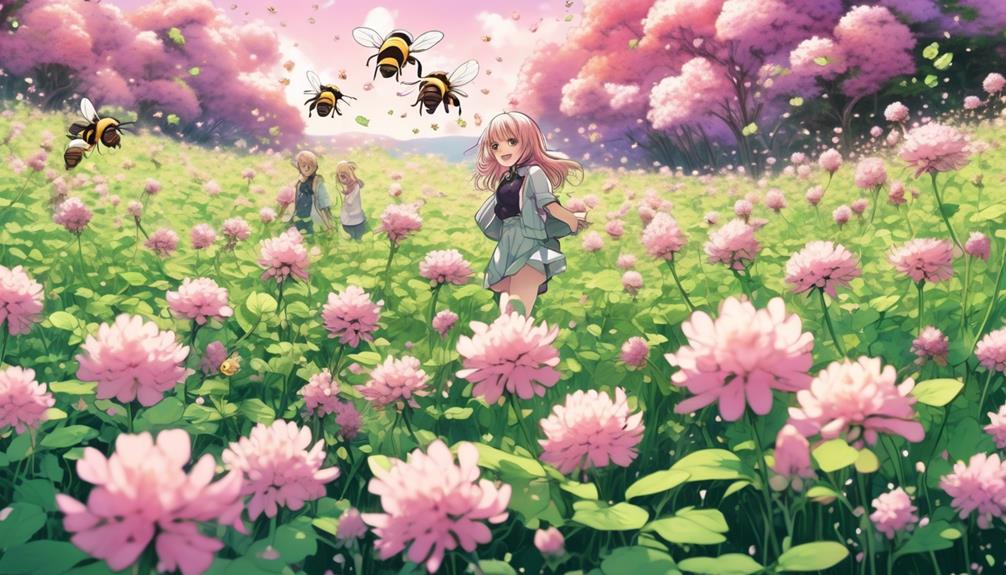
To understand the intricate relationship between bees and plants, it's essential to delve into the specific preferences bees exhibit when selecting plants for foraging. You may observe that bees aren't random in their choices and they, in fact, follow a certain pattern.
Bees prefer plants with abundant nectar and pollen, their primary food sources. Certain plant species, like the alsike clover, are particularly attractive to bees. They're drawn to its white and pink blossoms, high nectar yield, and pollen-packed anthers. Bees also lean towards plants which offer a continuous bloom throughout different seasons, ensuring a constant food supply.
However, it's not just the quantity but also the quality of nectar and pollen that matters. Bees prefer high-sugar nectar which provides them energy, and protein-rich pollen for growth and development. They're also attracted to plants with bright colors and sweet fragrances, as these cues signal the availability of nectar and pollen.
Alsike Clover's Appeal to Bees
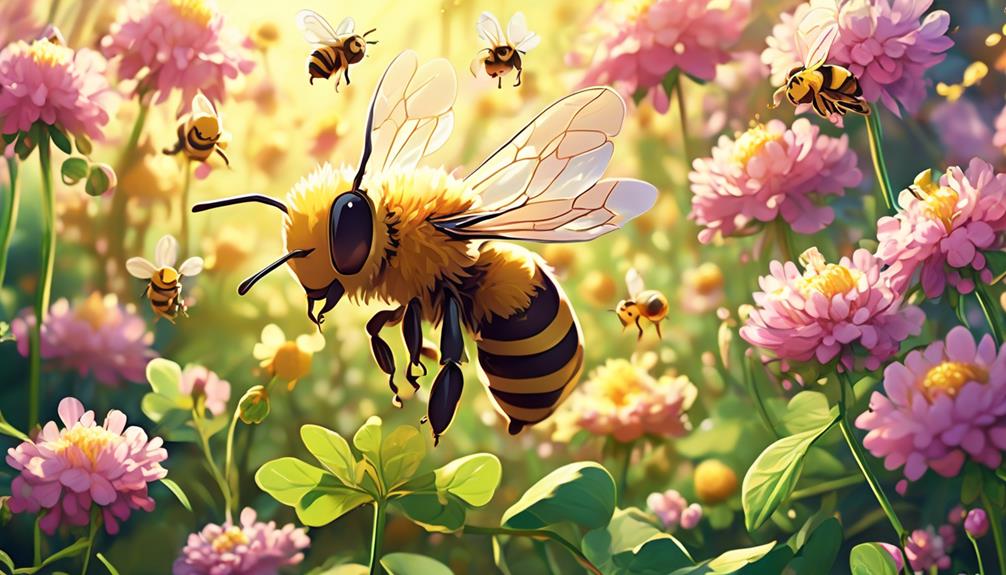
Focusing specifically on the alsike clover, you'll find it's not just its vibrant blossoms that attract bees, but a combination of factors that make it a prime choice for these industrious pollinators.
Alsike clover, or Trifolium hybridum, produces an abundance of nectar, a primary food source for honey bees, and its blossoms remain viable for longer periods compared to other clover species.
The plant's blossoms, which range from white to pink, have a particular visual appeal for bees. Their color spectrum falls within the bees' visual range, making them highly attractive to these insects. Additionally, the shape and size of the alsike clover's blossoms facilitate easy access for bees, allowing them to collect nectar efficiently.
Moreover, the alsike clover's ability to thrive in various soil types and climates gives it an edge. It can bloom over a wide temporal range, providing a consistent food source for bees throughout the season. The plant's resilience and adaptability, coupled with its nectar-rich flowers, make it an ideal choice for bees.
In a nutshell, the alsike clover's visual appeal, nectar production, and adaptability are key factors in its attractiveness to bees.
Beekeeping With Alsike Clover
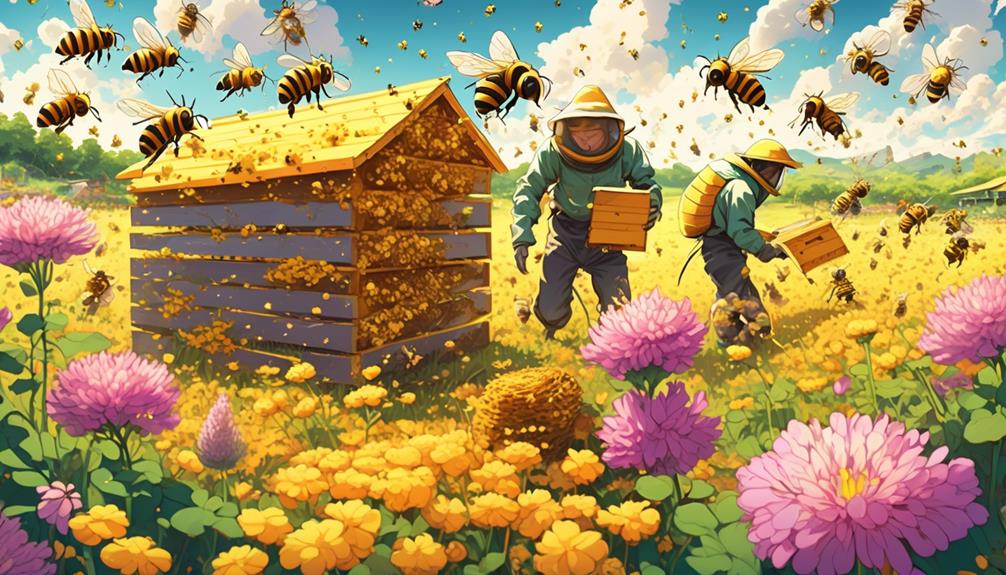
As a beekeeper, you'll find that cultivating alsike clover can significantly boost your honey production due to its high nectar yield and attractiveness to bees. This perennial plant, scientifically known as Trifolium hybridum, thrives in poor soil conditions where other plants can't, adding to its value in apiculture.
Alsike clover's long blooming period, from late spring to early fall, ensures a consistent nectar source for bees. This factor is critical in sustaining hive activity and honey production over several months. Due to its white and pink flowers, alsike clover lures in bees with its vibrant colors and sweet nectar.
When planting alsike clover, it's best to do so in early spring. Till the soil lightly and scatter the seeds evenly. It doesn't require much maintenance, but you should ensure the soil remains moist during the initial growth phase.
Integrating alsike clover into your beekeeping practices can potentially increase honey yield and support bee health. Its resilience, long blooming period, and high nectar production make it a beneficial addition to your apiary. Embracing this approach can ensure a bountiful harvest and a thriving bee community.
Impact on Bee Populations
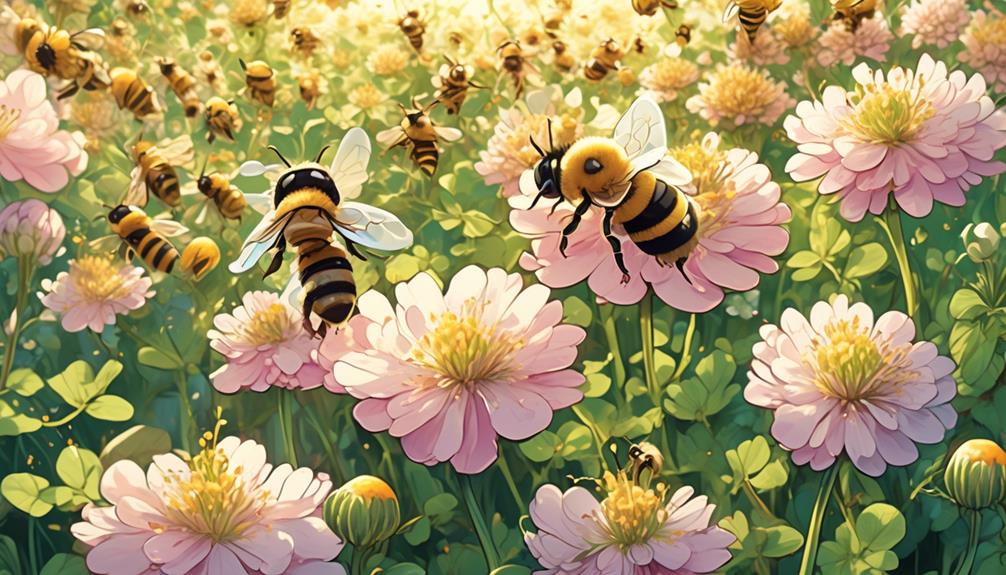
Planting alsike clover not only boosts your honey yield, but it can also have a profound impact on bee populations, enhancing their survival rates and overall health. This perennial plant, with its pinkish-white flowers, is a rich source of nectar and pollen for bees, providing them with the necessary nutrition to thrive.
Alsike clover's blooming period overlaps with the active foraging season of bees, ensuring a steady food supply when bees need it most. This reduces the risk of starvation, especially during periods of dearth when other food sources are scarce. A well-nourished bee population tends to be healthier and more resistant to diseases and parasites.
Moreover, alsike clover's propensity to grow in diverse environments enhances the geographical range of bees. By planting it in areas where bees may not commonly venture, you're expanding their habitat, which can lead to an increase in bee population.
Frequently Asked Questions
What Other Types of Clover Do Bees Typically Prefer?
You're curious about other clovers bees might prefer, right?
They're actually quite fond of red and white clover. Red clover's nectar is easy to access and provides a good energy source.
White clover, on the other hand, is popular due to its wide distribution and long blooming period.
They'll also visit crimson and sweet clover.
How Does the Taste of Honey Change When Bees Pollinate Alsike Clover?
When bees pollinate Alsike clover, it impacts the honey's flavor compared to other sources. You'll notice a light, mild taste with a hint of sourness in honey from Alsike clover. It's less sweet than honey from other clovers.
The color's also lighter, almost white. So, yes, the taste of honey does change when bees get their nectar from Alsike clover. It gives you a unique flavor profile that's different from the typical clover honey.
Are There Any Potential Health Risks for Bees That Primarily Feed on Alsike Clover?
Yes, there can be potential health risks for bees that primarily feed on Alsike clover. Consuming large amounts of this clover can lead to a condition known as 'Alsike Poisoning.' The symptoms include damage to the bee's digestive tract and a decrease in honey production.
It's crucial to monitor your bees if they're feeding predominantly on this plant to ensure their wellbeing. So, keep a balanced diet for your bees to avoid any health issues.
Does the Cultivation of Alsike Clover Have Any Significant Environmental Impacts?
Yes, the cultivation of Alsike clover does have environmental impacts. It's a nitrogen-fixing plant, improving soil fertility and reducing the need for chemical fertilizers. It also provides a dense ground cover, reducing soil erosion.
However, it can be invasive, outcompeting native plants. While it's beneficial for pollinators like bees, it's not without potential drawbacks.
Always consider these factors when deciding to plant it.
Besides Bees, Which Other Pollinators Are Attracted to Alsike Clover?
You're curious about other pollinators for alsike clover, aren't you? Well, it's not just bees that love it! Butterflies, moths, and some species of beetles are also attracted to this plant. They're drawn by its sweet nectar and vibrant color.
Even certain types of birds, such as hummingbirds, find alsike clover appealing. So, it's not only a bee favorite but a favorite of a wide variety of pollinators.
Conclusion
So, do bees like alsike clover? Absolutely! This clover variety offers pollen and nectar that bees can't resist. As a beekeeper, incorporating alsike clover into your strategy can boost your hive's success.
Plus, supporting the growth of this plant can help sustain bee populations. Remember, a happy bee is a busy bee, and alsike clover can play a key role in keeping our buzzing friends content and productive.

